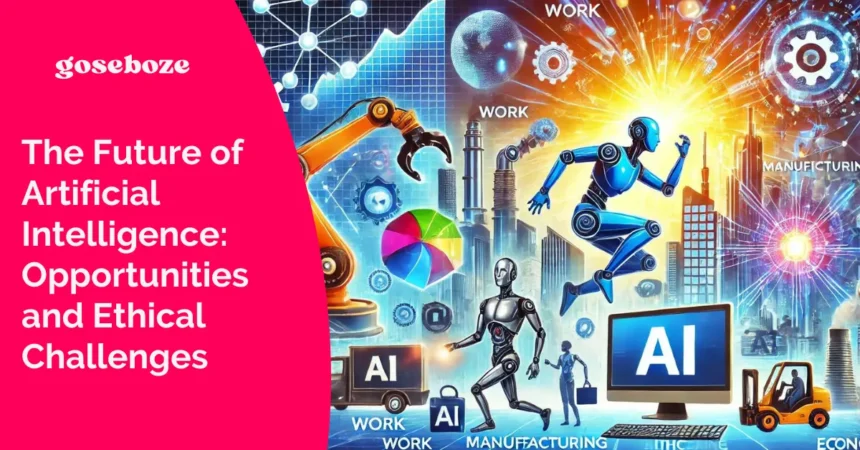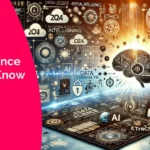AI technology is changing the world right now, impacting the way we approach work, manufacturing, and healthcare; its impact is also visible in our economy and society. We don’t really know how exactly it’ll shape the future, but we know one thing: AI is here to stay.
So, let’s look at the potential opportunities and challenges that AI might bring in the future.
Artificial Intelligence: Overview
The first records of “artificial intelligence” go back to the 1950s. It first appeared as a concept, aimed at future application. But even then, the “father” of modern computer science proposed measuring “the intelligence of a machine”, implying that there was something to measure. But in the 20th century, there wasn’t much focus on AI, so it remained a concept, until 2018.
In 2018, the first GPT models by OpenAI were released. From then on started the era of AI integration, which ultimately touched every industry, market, and simple daily living.
AI applications have become part of machine learning, healthcare, finance, marketing, the automotive industry, research, accessibility practices (i.e., human speech recognition), and many other areas. However, in the future, experts suggest that some sectors will integrate AI more than others.
What industries will be impacted by AI the most in the future?
The fact is that no major industry is completely “free” of AI right now, and such a tendency will probably remain. However, some sectors will, reportedly, use AI more than others.
Healthcare
AI has already changed a lot in healthcare, from how individuals interact with healthcare providers to the way diagnostics is performed. We already have clinical prediction performed by AI using electronic health records, and it will go further to interpreting the results of diagnostics.
AI will continue to help the intelligent management of patient data, ensuring its privacy. AI will also be able to diagnose diseases based on symptoms and suggest the right medication for various conditions, which people can then order remotely.
AI will also assist in finding better regimens for chronic diseases, and even a cure for the ones that are currently untreatable.
Read Also: The Pizza Edition: Your Gateway to Fun and Games
Manufacturing
Manufacturing has been using automation by AI for years now. Industrial robotic systems will continue making the manufacturing of products quicker and less resource-demanding.
AI will also help enhance safety in manufacturing, advising optimization where it’s due, and alarming people in cases of emergency.
Finance
Traditional banking systems will continue leveraging AI for the detection of fraud, and evaluation of credit history and other related records.
Individuals can also utilize AI to manage their finances better, with artificial intelligence performing the role of a financial advisor. With the wider integration of cryptocurrency, AI will help analyze the trends and advise on investments, both related to crypto and conventional currency.
Moreover, AI will help people to kickstart or improve businesses, and consulting services.
Education
AI will continue to help people of different ages and backgrounds learn more easily. By using machine learning, speech recognition, and language processing, it will help to format books and lectures, optimize courses, provide help with assignments, and detect plagiarism.
The educational system as we know it can potentially change because of AI. Artificial intelligence might help teachers to evaluate the potential of every student better, creating a fertile environment for them to grow and evolve; it might also help to find a better approach to struggling students.
Media and Marketing
Regarding content, AI has already transformed the way people approach media, social media, and marketing.
AI will help analyze the target audience, its pain points, and the tone of voice needed to get through to a specific group of people. In the future, AI writing tools will be able to deliver content that is more human-like and follows the goal of the business.
It’ll also be able to create ad campaigns more precise and relatable, which will result in increased conversions and a business’s reputation.
Customer Service
AI will be able to deliver the most human-like customer assistance in the future. It will promptly analyze the problem, and find a solution to it. Businesses are likely to integrate models of AI customer support representation.
Concerns About the Future Integration of AI
Many people are concerned about the effects of AI on their lives, and rightfully so. While AI can simplify some areas of human lives, it can complicate others.
Privacy Risks
Even though artificial intelligence doesn’t pose bigger privacy risks than the technology we’re using now, it still brings about its challenges.
When we think about privacy risks, data breaches come to mind, which are classified as targeted attacks on organizations with malicious intent to steal sensitive data. Businesses and individuals have learned to protect themselves from potential threats like these by using reliable technology, which extends to software and server infrastructure. The latter is of particular importance since it forms a basis for the overall security of any system. If you are looking for a reputable hosting provider, consider the hosting plans here.
Privacy risks imposed by AI are different. The processing of personal data performed by artificial intelligence poses a threat to the rights and freedoms of individuals, because:
- AI tools store data much longer than other technology.
- AI repurposes the given data and intends to use it in other instances.
- AI has poor regulations around data collection.
Another problem is that individuals whose data is gathered might never be aware that their information is used for different purposes, for example, forwarded to businesses for marketing purposes.
Job Losses
AI is intelligent, it’s in the name. And it completes certain tasks more efficiently than humans. Businesses figured it out. And since their main objective is to cut their investments in the workforce, many people could potentially lose their jobs due to AI.
Based on analysis, more than 40% of skills that individuals base their careers on, won’t be needed anymore, because AI will allegedly replace them by 2028. And because there is an existing pay gap between men and women, women are more at risk of losing their jobs due to artificial intelligence.
In the worst-case scenario, the situation might get out of control, resulting in major unemployment, and further downfall of the economy.
Deepfakes and Misinformation
This is probably one of the most concerning influences of AI. Deepfakes are already spreading, which makes it hard for people to discern factual information from a fake. The effects of misinformation might be catastrophic for entire countries because deep fakes might be used to spread political propaganda for instance.








